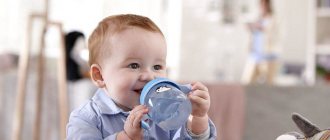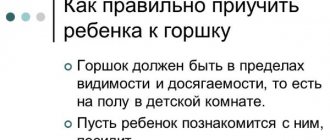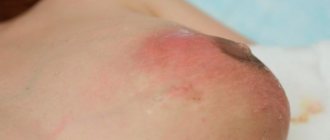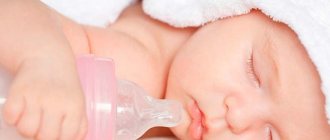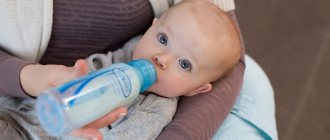For many babies, a pacifier in the mouth is a necessary condition for quickly falling asleep and restful sleep. The pacifier creates a feeling of the constant presence of the mother, creates a feeling of security and inner peace. This is the basis, without which the baby will experience anxiety and difficulty going to bed.
As the baby begins to grow up, parents increasingly think about how to wean their child from falling asleep with a pacifier. You shouldn’t rush into this matter, but you shouldn’t delay it either, because over time, sucking a pacifier can develop into a bad habit.
Why is it worth weaning your baby from sleeping with a pacifier?
For many parents, a pacifier in the first months of a newborn’s life becomes a real relief from baby’s crying. But if the baby gets very used to the pacifier, uses it constantly, and does not part with it day or night, then this can lead to problems in the development and health of the baby.
The most common side effects from long-term pacifier abuse are:
- Dental malocclusion. Teeth begin to grow crooked if a pacifier is used after the age of two.
- Risk of inflammation of the middle ear (otitis media).
- Slow development of the speech apparatus. The more the mouth is occupied by the pacifier, the less children will use language and sounds to communicate with others. After all, in order to start communicating, you first need to pull out the pacifier, and at a young age, children may not immediately think of this. Late development may further affect the pronunciation of individual sounds.
- Risk of contracting an infection. Nipples often fall off. While children are very small, mothers pick them up, wash them and return them to the baby. As they get older, they themselves learn to pick up a pacifier from the floor or the ground and put it straight into their mouth. At this point, an infection may occur.
Often parents begin to use the method of shortening the pacifier. He has an argument “against” because of its unsafety for the life and health of the baby. The integrity of the pacifier is compromised and during active sucking a piece of latex can enter the child’s respiratory tract with all the ensuing consequences.
Arguments for and against pacifiers
The silicone accessory has both advantages and serious disadvantages. Therefore, it is worth considering all the opinions of specialists: pediatricians, orthodontists, speech therapists and psychologists.
Benefits of pacifiers
Despite the skepticism of some mothers, experts highlight a number of clear positive aspects from using an infant pacifier.
- The main advantage of the pacifier is the ability to quickly calm the baby. When he is capricious, unwell, or excited, the pacifier quickly relaxes and brings long-awaited calm to all household members. It also helps the baby fall asleep faster.
- The pacifier will help distract the baby when performing various unpleasant procedures, for example, during routine vaccination.
- A pacifier can help if it is necessary to limit the child’s use of milk or artificial formula (for example, if the baby is overweight), without reducing the sucking reflex.
- The silicone device allows the child to more easily endure an airplane flight and reduces discomfort caused by pressure changes. Sucking on a pacifier also reduces ear congestion during flight.
- Dissatisfaction with the sucking reflex causes the baby to pull his fingers, diaper or blanket into his mouth. In this case, sucking a pacifier is the best way out of all of the above.
- It is believed that a pacifier can significantly reduce the risk of sudden infant death syndrome. Design features (ring and ventilation holes) will allow air to enter the lungs, even if the child gets tangled in the blanket.
The above does not mean that immediately after the maternity hospital a newborn must be accustomed to a pacifier. The baby must suck on the mother's nipple or bottle, and often you can do without a silicone device.
Disadvantages of pacifiers
Some parents may shrug their shoulders in bewilderment and ask a completely justified question: if everything is so good, then why do you need to wean your child off sucking a pacifier?
In fact, all the advantages are easily offset by the negative effect of the pacifier on the development of the baby if it is used for too long. Thus, experts highlight several significant negative aspects of using silicone pacifiers.
Among them:
formation of malocclusion;- delayed speech development and incorrect pronunciation of hissing sounds by the baby;
- delayed cognitive development;
- insufficient involvement of the child in interaction with peers;
- psychological infantilism;
- infectious lesions of the oral cavity (stomatitis, candidiasis) resulting from insufficient treatment of the pacifier.
Teledoctor Komarovsky is convinced that the pacifier does not pose any particular harm to the child. The desire to wean off the pacifier is dictated from the outside: by grandmothers, neighbors, just strangers who look with bewilderment and mockery at a mother and a grown-up child with a pacifier.
The prerequisites for the undesirable consequences described above, according to a popular pediatrician, lie in poor heredity, the poor state of nature, and the individual physiological and psychological characteristics of the child.
And yet, most experts recommend getting rid of pacifier sucking so as not to disrupt child development. After all, an older child no longer needs this silicone item, and the previously important action becomes an annoying bad habit.
When to start the weaning process
When a newborn sucks on a pacifier, he satisfies a basic need - the sucking reflex. It is laid down by nature that the satisfaction of this reflex occurs when he sucks the mother's breast. In this way he is satisfied, feels his mother’s warmth and his safety. Depending on the conditions in which the baby develops and grows, the presence of health problems, the emotional atmosphere in the home and many other conditions, the need for the sucking reflex can vary greatly among different children.
Adults, especially inexperienced parents, often neglect to satisfy the natural needs of children, and instead put a pacifier in their mouth. If you do this often, every time the baby cries, then it will be difficult to wean it later.
Different doctors have different opinions on the topic of weaning off the pacifier.
Pediatricians recommend starting this process at the age of six months, but not later than twelve months, believing that during this period we are talking about a bad habit, and not about the benefit of the baby. The process itself should occur gradually, without causing sudden stress in the little one.
Dentists, when talking about weaning, worry about malocclusion and uneven tooth growth. In their circles we are talking about ages from one to two years.
Psychologists say that two years is the turning point when a pacifier is no longer needed. And if you actively use it, your speech apparatus and intellectual development will suffer.
Parents strive to instill in their children greater independence by the age of 3, when it is time to go to kindergarten. There is such a fear as ridicule from peers towards their child during this period. So they are trying to wean it off by this age.
Every baby is unique from birth. It has its own characteristics and needs. It develops on its own schedule. And parents, when weaning off the pacifier, need to be attentive to the baby and be aware of why he needs the pacifier.
If a child never leaves her, then taking her away once and for all will be a painful stress that can undermine his basic trust in the world.
It is possible that he simply does not have enough attention from close and dear people, and the pacifier is a surrogate for his mother. He can't say anything about it. But he just cries and tries to return to the way he understands and knows to calm down. Then you should give your child more attention and warmth, increase physical contact and spend more time communicating and smiling.
Proper weaning of a baby at 2 years old
When a baby turns 2 years old and uses a pacifier, others begin to react to this with condemnation.
Some children at this age already go to kindergarten, so teachers ask them to wean the child off the pacifier.
There are several effective methods and correct recommendations:
| Way | Detailed description |
| Making up a fairy tale | Parents appreciated the effectiveness of the method. Children are told an instructive tale about a fairy from a magical land. She brings pacifiers to the babies. Big children helped and left pacifiers at night. She took them and gave them a gift. You can come up with your own instructive story. It's important to show a little imagination |
| A little trick | We can say that the pacifier is lost or forgotten at a party. If the baby reacts calmly to the loss, there is no need to show him the pacifier. When he cannot calm down for a long time, you need to give him a pacifier. Severe stress is harmful, so after a while you can try again |
| Breakdown message | You need to cut off the rubber part from the nipple yourself, and wait until the moment when the baby starts asking for a pacifier. It is necessary to show him that his favorite thing is broken and cannot be repaired. New pacifiers are being sold to very young children |
To make weaning quick and painless for the baby, you should not raise your voice at him or spank his hands.
There are no scary stories when children were taken away for using a pacifier for a long time. You cannot shame, tease or point out inferiority.
How to wean your baby from sleeping with a pacifier
The main thing is gradualism. Weaning should proceed smoothly, without prolonged hysterics and tears.
If the child is healthy, actively explores the world during the day, his life contains a variety of games and toys that promote diverse development, his mother spends enough quality time with him, then by the evening he gets tired and calmly, quickly falls asleep. It is on one of these evenings that parents can try to eliminate the pacifier from the nightly ritual.
If a child cries a lot and is worried and cannot fall asleep without his favorite pacifier, there is no need to torture him. We need to give it back, and after some time repeat the experiment.
It is the distraction of attention, its switching to another, more interesting phenomenon or object that is key to weaning off the use of a pacifier. Pastime options that help your child fall asleep quickly:
- Parents can read interesting picture books, fairy tales, where characters can be moved or pasted in different places.
- Active evening walks, as a result of which the child works hard physically, gets tired and then falls asleep well. As soon as a child learns to walk, it is necessary to accustom him to long walks.
- Relaxing, soothing, warm baths before bed. After consultation with your pediatrician, you can add different herbs to them. Kids fall asleep well after them.
- Relaxing massage after swimming. Stretch your legs, back, without sudden movements, stroke your tummy. An important condition is that your hands should be warm and pleasant.
- Start a tradition of singing lullabies. After a few minutes, the child will get used to his mother’s quiet voice singing a gentle song. Older children begin to think about the meaning of the words of the song and gradually fall asleep.
- Warm milk before bedtime promotes a peaceful bedtime. Give your child a drink and he will sleep better.
All these methods will help your child fall asleep easier and become familiar. A pacifier is a substitute for maternal warmth and affection. And having made a little more effort, giving the child their own time and attention, parents notice that he remembers the pacifier less and less and over time gives up on it completely. The best remedy is parental love.
Doctors' advice
Experts have varying opinions regarding the use of pacifiers.
- Pediatricians believe that sucking a pacifier before the age of six months is justified by a strong sucking reflex. The child’s need for it will go away on its own and there is no need to worry. It is important to avoid extremes and not give the child a pacifier when he can be distracted in another way. Then there will be no problems with weaning.
- Psychologists explain babies' love for pacifiers by insufficient physical contact with their mother. If the need for closeness with the mother is satisfied, an artificial substitute will not be needed. A baby's stable psyche is formed by breastfeeding on demand and skin-to-skin contact.
- Breastfeeding experts believe that a pacifier interferes with natural feeding. Attachments to the breast are replaced by sucking on the nipple, because of this the amount of milk decreases, and the child’s grip on the mother’s nipple deteriorates. As a result, the child does not gain weight well, and additional formula feeding becomes necessary. The best substitute for a pacifier is mother's breast.
- Dentists are against sucking pacifiers after teething. A pacifier can ruin a child's bite. During the day, to calm down, it is better to give something to chew on, as the sucking reflex gives way to itching in the gums. At night it is better to do without a pacifier and its substitutes.
What not to do
With young children, regardless of age, the basic rule is to do no harm.
When parents are faced with the question of how to remove the pacifier from their baby's sleep ritual, the search for answers is usually limited to their closest relatives and friends. But often these answers are incorrect and far from the truth. These “helpful” tips boil down to demanding strict measures, such as:
- Lubricate the pacifier with mustard or something unpleasant;
- Throw it away in front of him for him to see;
- Leave him to cry to his heart's content, demanding a pacifier. Like, he will cry and calm down. This type of crying can last for several weeks every evening. And the baby will go to bed with a deep feeling of hopelessness.
- Force the baby to throw out the pacifier.
But for a child, the pacifier is the whole world. She is a cure and a help for everything in the world. And such harsh measures can negatively affect the further development of the baby.
Giving a pacifier as a way to give it up
Most young parents believe that the best way to force their child to give up a pacifier is to ask him to give it to someone, for example, a sister or brother, if he has one. If the child is alone in the family and there are no kids around who are so close to him, then you can give a pacifier to a cat, a squirrel in the park, a crow with its chicks, and so on, you can think of anything.
Until the child himself decides to give up the pacifier, no measures taken by the parents will have any result, at least not without hysteria.
Using this method, it is worth remembering that if the baby does not want to give a pacifier, in no case should you take it away, put moral pressure on it, or say that he is greedy. We must try to do everything so that the donation process does not turn into a drama for the child. If the baby categorically does not want to part with the pacifier, this indicates that the time has not yet come when you need to try to wean him, and you just need to wait.
What Doctor Komarovsky advises
Dr. Komarovsky is categorical on the issue of weaning children off pacifiers. He believes that the pacifier is the satisfaction of their needs. Each of them faces certain tasks in mastering the surrounding reality. And as soon as the child solves these problems, he gets rid of the pacifier himself. There is simply no need for it.
For a little person, the world is full of unknowns and fears. And the pacifier, being a surrogate for the mother’s nipple, serves as insurance and tells him that everything is in order. Thus, the child is not afraid to master some new activity, he feels more confident. And when the brain is not busy fighting fear and the unknown, it is open to exploration.
Can a newborn be given a pacifier at night?
Newborn babies have a highly developed sucking reflex. The more pronounced it is, the more difficult it is to calm the baby without a pacifier. Such a child will put everything in his mouth - fingers, a blanket, a diaper. In this case, it is better to give him a pacifier. Having satisfied the need for sucking, the baby will calmly fall asleep.
If your baby sleeps better with a pacifier than without it, you shouldn’t deny him. But you should not abuse this method of calming. It will be better if the pacifier is used only to relax the baby before bed.
What time do you go to bed?
First, decide on the mode. No, no, a small child cannot have clear boundaries. But there must be a rhythm of sleep and wakefulness.
There are special tables that are easy to find on the Internet, which indicate how much a child of a particular age should sleep per day (it is important that the amount of daytime and night sleep is respected ), as well as how much wakefulness the baby can withstand. For example, if the baby is almost six months old, then his waking time is 2:15, the total sleep rate is 13-15 hours, the duration of daytime sleep is 2-4 hours, and nighttime sleep is 10-12 hours.
General rules for all children that correspond to the biological clock of children under 6-7 years old: getting up no earlier than 6 am (before this you need to maintain silence and darkness, even if the child woke up) and no later than 7:30, and bedtime - between 19-19. 21 pm .
This means that as soon as the child wakes up in the morning, you need to note the time and by the end of the waking time, catch signs of fatigue. As soon as the baby yawns, the ritual must begin.
It's hard to fight instinct
As mentioned above, there is no age when it can be said that a child urgently needs to be weaned off a pacifier. However, before the age of 1 year, this is definitely not worth doing, since an infant has a particularly developed sucking reflex, and if you take away his pacifier, he will use something else instead, his own finger or his mother’s breast. For a baby under one year old, a pacifier is a kind of sedative, thanks to which he falls asleep faster and easier and is less capricious. This is due to the fact that with the help of a pacifier they follow their instinct.
The only thing worth knowing is that you should not offer a pacifier to infants who are breastfed, since it is at this time that the sucking reflex and attachment to the breast is considered the most powerful simulator of lactation. After feeding has improved and the mother is convinced that there is a sufficient amount of milk, you can begin to give the baby a pacifier to satisfy his sucking reflex.


